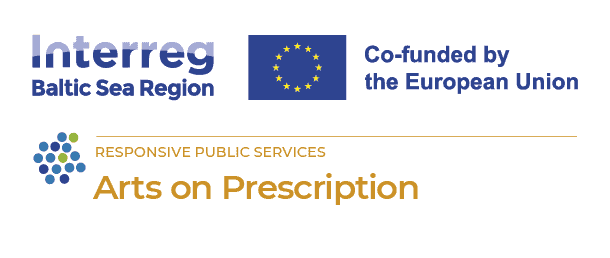
National Seminar in Turku Showcases the Power of Arts on Prescription for Mental Well-being
08 June 2025
On Friday, 23 May, the Turku University of Applied Science as part of the Arts on Prescription in the Baltic Sea Region project hosted a vibrant national seminar titled Art Prescription for Mental Well-being at the Kupittaa campus in Turku, Finland. Bringing together 110 participants both in-person and online, the hybrid event united professionals from art and culture, social and healthcare services, as well as education sectors to explore the growing potential of art-based interventions for mental health.
What is Arts on Prescription?
Liisa Laitinen, project’s Chief Content Officer at Turku University of Applied Sciences, opened the seminar with an overview of the Arts on Prescription model developed, piloted, and evaluated during the project. The model encourages referrals of individuals aged 15 and older experiencing mild to moderate mental health challenges – such as anxiety, depression, or stress – or feelings of loneliness to regular group-based art activities.
Referrals can come through a variety of channels, including social and healthcare professionals like GPs and psychologists, educators such as teachers and school psychologists, employment services, and NGOs.
Participants engage in small groups led by experienced art and culture professionals – artists, art educators, and museum educators – over 8 to 12 weeks. Sessions occur 1 to 2 times weekly and last 2 to 3 hours, offering participants the chance to explore 3 to 5 different art forms, including theatre, dance, creative writing, music, and visual arts. The groups may also visit cultural institutions such as museums, theatres, and opera houses. However, the model does not rely solely on visits to cultural institutions – at its core is creative activity and hands-on artistic engagement, both individually and together as a group.
Local Pilots Demonstrate Adaptability Across the Baltic Sea Region
Over the course of the project, 24 pilot groups have been run in five countries, adapted to local contexts in terms of referrals, target groups, and art forms. In Sweden, Latvia, and Poland, six pilot groups have been held in each country, and three each in Denmark and Germany.
Cēsis, Latvia
Project manager Inga Surgunte and link worker Baiba Roze spoke about the Museums on Prescription programme piloted in the municipality of Cēsis in Latvia. The model has been developed in collaboration with local museums. Referrals came via social and rehabilitation centres and employment services. Activities included guided museum tours, theatre, music workshops, visual arts, and creative writing.
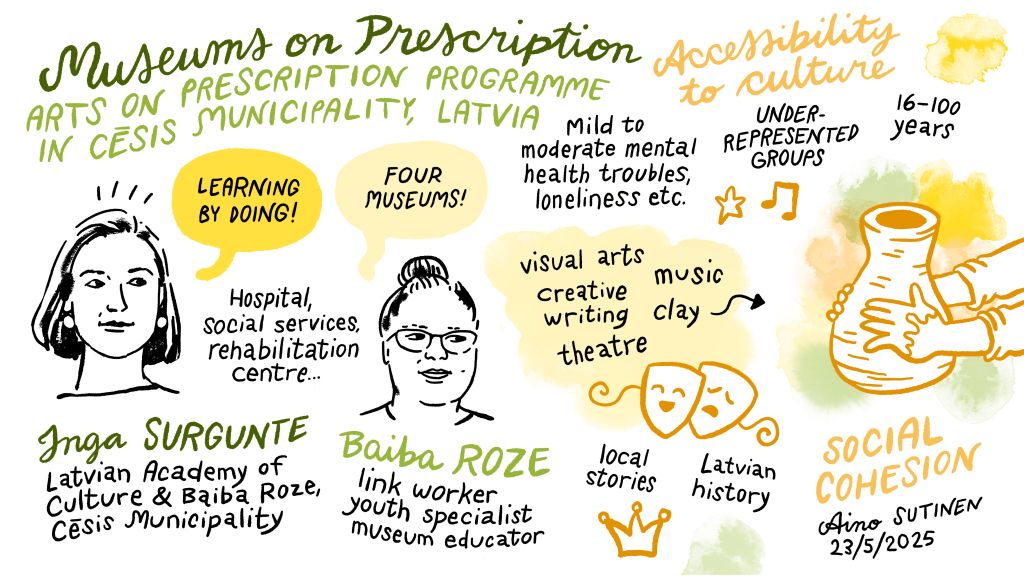
In addition to supporting participants’ mental well-being, the museum prescription activities have improved the accessibility of museums and brought in new audiences. Image: Aino Sutinen
Norrbotten Region, Sweden
Elias Sandling, project manager at Sunderby Folk Highschool, described pilots in Boden and Luleå where referrals from healthcare coordinators targeted adults experiencing stress, anxiety, depression, and extended sick leave. The programme featured visual arts (including natural materials), dance, movement, and singing.
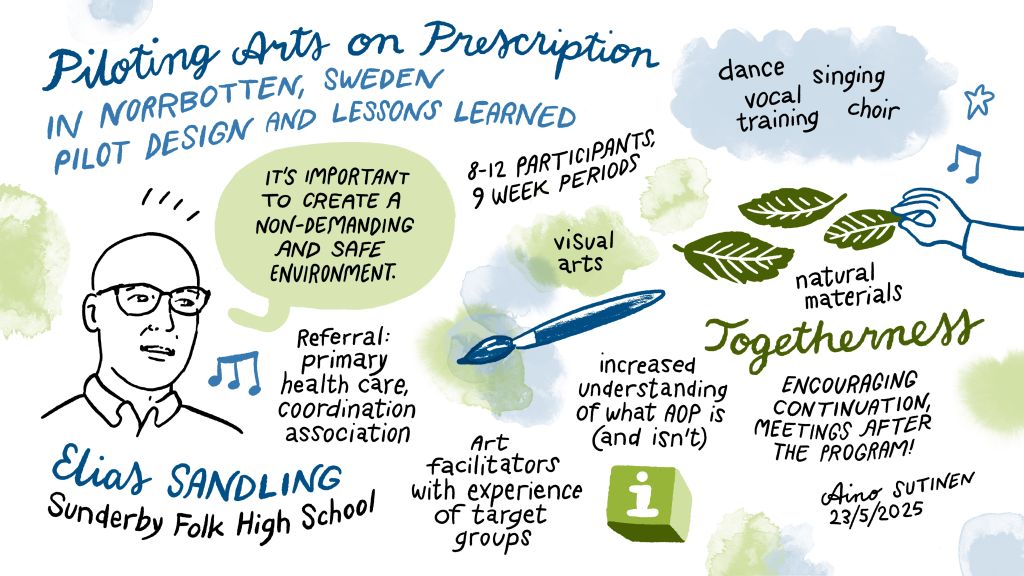
Image: Aino Sutinen
Bremen, Germany
Hannah Goebel, project manager at vhs Bremen (adult education centre), introduced a slightly different version of the Arts on Prescription model in Bremen, Germany – the so-called inclusive model. Rather than organising separate, closed art prescription groups, participants in Bremen were referred to existing art courses at the adult education centre. For each course – such as singing, creative writing, and visual arts – 2 to 5 places were reserved specifically for participants joining via an art prescription. Referrals came from rehabilitation centres, GPs, and psychotherapists. Participants also met in special group sessions to share experiences.
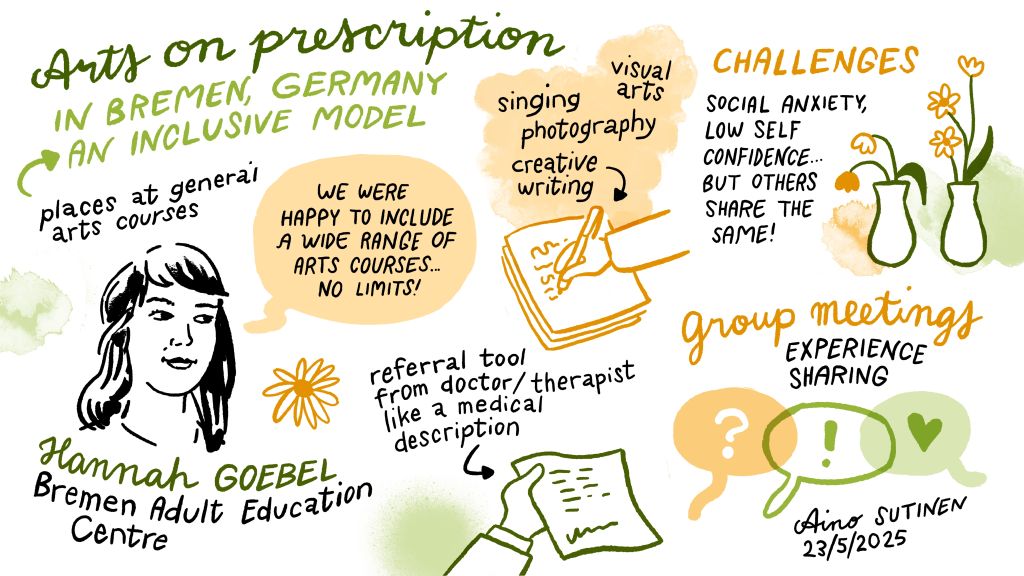
Image: Aino Sutinen
Evaluation Highlights: Supporting Mental and Social Well-being
Liisa Laitinen and Outi Linnossuo presented findings from qualitative evaluations. The Arts on Prescription activities were evaluated across all 24 pilot programmes, and between each round of pilots, the model was further developed based on the evaluation findings.
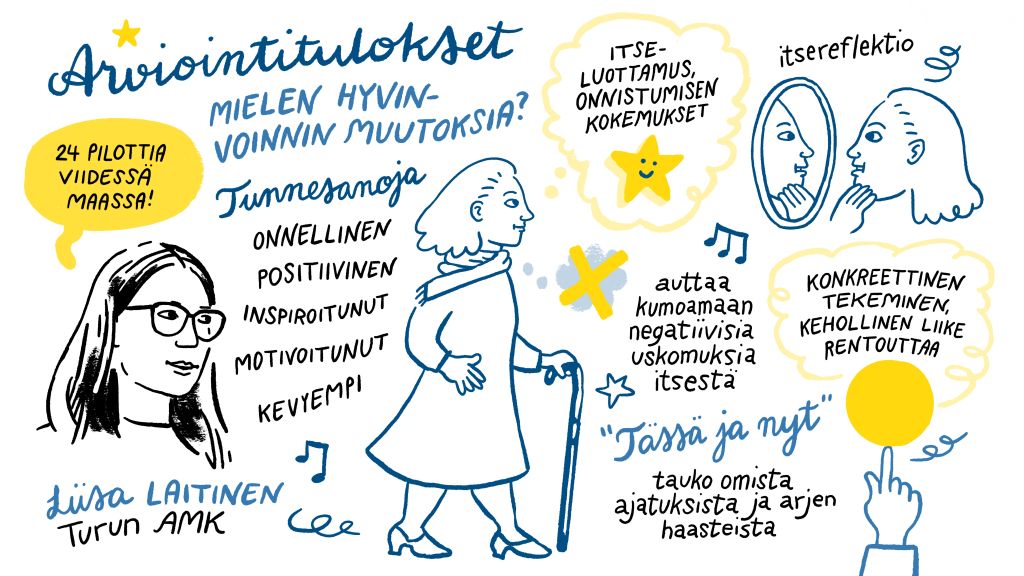
The project includes process evaluation, economic evaluation, and an assessment of the art prescription model’s impact on mental health and well-being. Image: Aino Sutinen
Participation in Arts on Prescription was shown to enhance mood, reduce stress, encourage self-reflection, and build self-esteem and confidence. It also helped widen perspectives, increase hope for the future, ease social interactions, reduce loneliness, and develop everyday life skills, such as emotional skills.
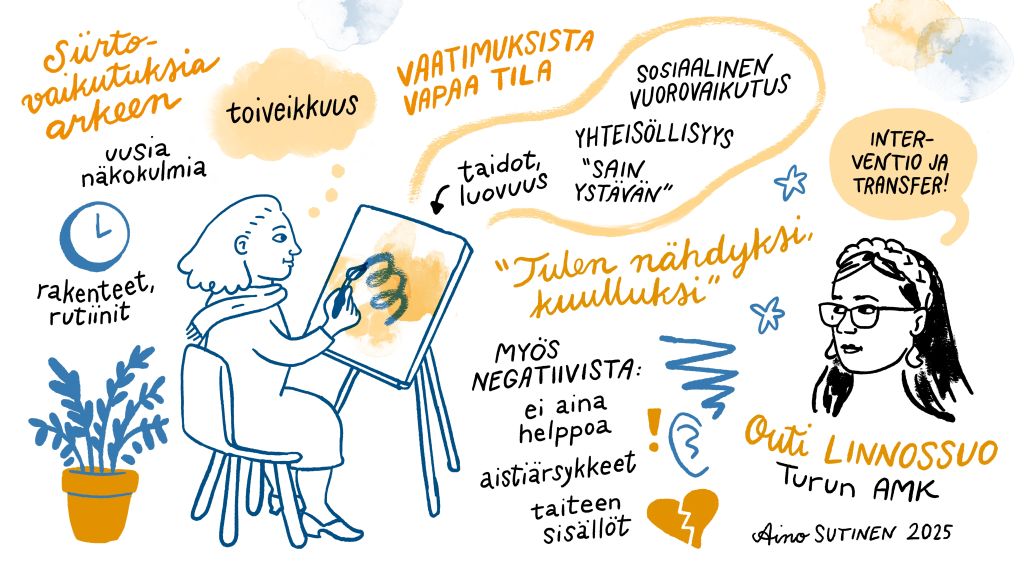
Image: Aino Sutinen
Creative and arts-based methods were used in the qualitative evaluation process and will be further detailed in an upcoming Arts on Prescription online guide. The full evaluation report will be published in autumn 2025.
Embedding the Model in Finland: Panel Discussion
A panel moderated by Outi Linnossuo discussed embedding the Arts on Prescription model in Finland, focusing on the Turku region. Panelists included Mari Lahti (regional councillor and chair of the Turku Social Democratic Party), Mirka Muukkonen (Deputy Mayor for Well-being, Left Alliance, City of Turku), Johanna Seppä (Public Engagement Curator at WAM Turku City Art Museum), and Hanna Hyytiä (Project Manager for Turku’s Community Engagement Flagship Project).
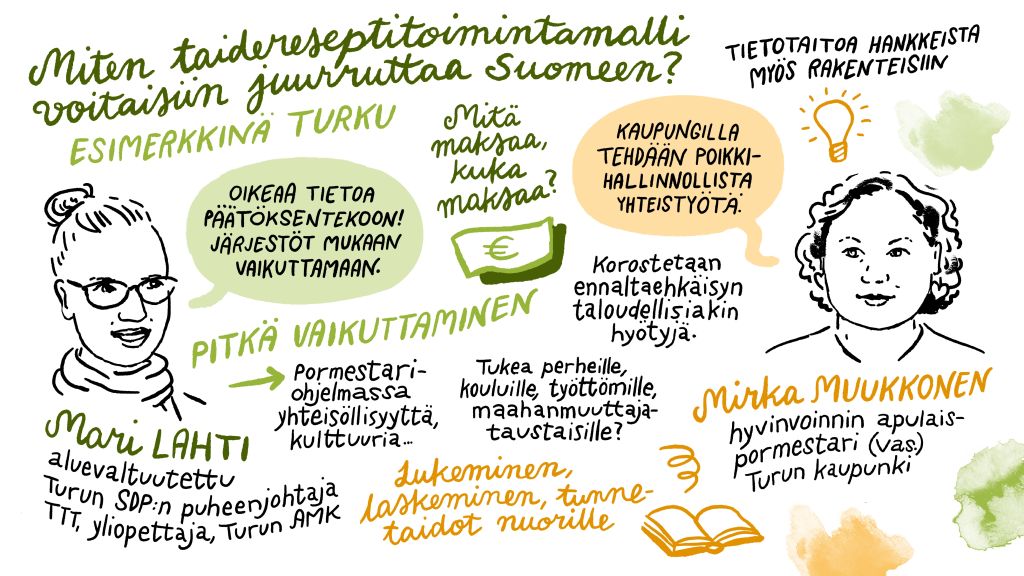
Image: Aino Sutinen
The discussion explored where the model fits within service provision and potential target groups – highlighting youth with migrant backgrounds, school-aged children, and working-age adults outside employment or education. Using welfare and health data to identify needs was stressed, as well as the need for cooperation between city authorities, wellbeing services counties, and NGOs.
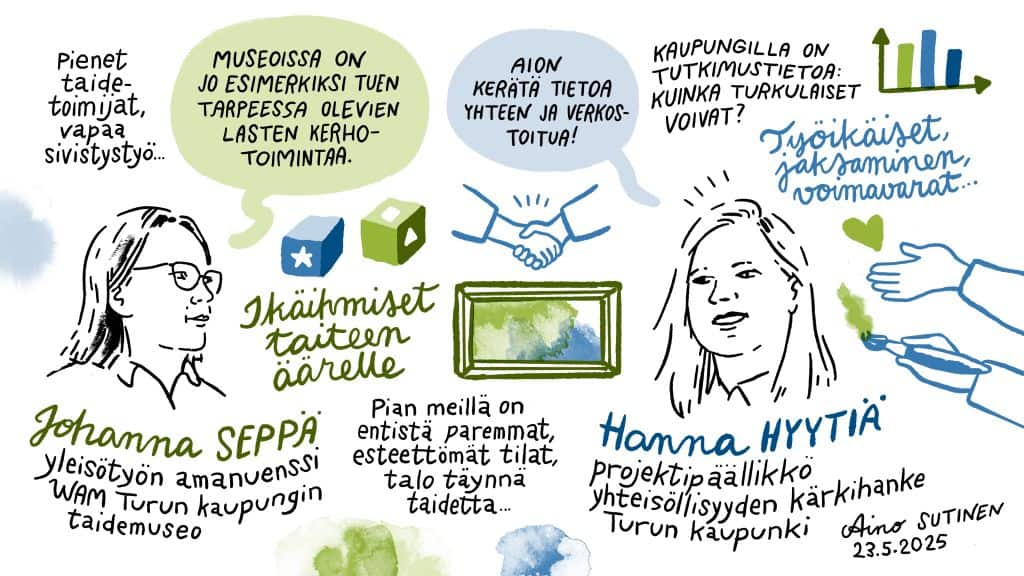
The panelists reflected on spaces in Turku suitable for implementing the model, such as arts institutions and local community lounges. Image: Aino Sutinen
Challenges and Opportunities
Funding and coordinating a multidisciplinary referral system remain major challenges, but panelists also saw opportunities in Finland’s evolving service structures. Raising awareness of the model’s benefits, including its economic value, was identified as a priority. Exploring sustainable and cost-effective funding models is key to successful implementation.
Hands-On Workshops Inspire Participants
The afternoon featured interactive workshops led by Annastiina Love and Aliisa Särkiniemi (Regional Dance Centre of Western Finland), who guided a dance workshop exploring movement and bodily communication, and Hanna Dufva (Creative writing instructor, Neuropsychiatric coach, and accessibility specialist), who led a creative writing workshop where participants created shared travel stories to places like Loch Ness and Pluto. These methods are well suited for inclusion in the Arts on Prescription programme.
A Successful Day of Insight, Inspiration, and Collaboration
The Art Prescription for Mental Well-being seminar in Turku offered a rich and inspiring day filled with new perspectives, practical examples, and meaningful dialogue. With over a hundred participants from across sectors, the event successfully showcased the potential of the Arts on Prescription model to support mental health in a creative, inclusive, and evidence-based way. From expert presentations and international case studies to hands-on workshops and visionary panel discussions, the seminar sparked valuable connections and set a strong foundation for the model’s future development in Finland and beyond.
—–
The event has been co-financed by the Interreg Baltic Sea Region Programme 2021 – 2027 in the frame of the Arts on Prescription in the Baltic Sea Region project.
Additional links
- Read about the project
- Art Prescription Supporting Mental Well-being – Co-developing a Baltic Sea Region Model – article in the Taidetutka online magazine (FI)
- Arts on Prescription - A generic programme concept for the Baltic Sea Region
- Video: Museum on Prescription – Arts on Prescription Programme in Cēsis municipality 2023-2025
- Arts on Prescription in Bremen, Germany
- Arts on Prescription in Norrbotten, Sweden
- Arts on Prescription in Cēsis , Latvia





